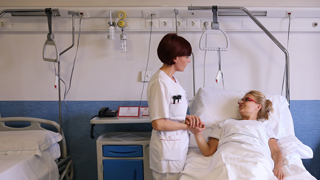
Offentliga tjänster
Offentliga tjänster som hälso- och sjukvård, utbildning, social omsorg och transporter är centrala för att åstadkomma en hög nivå av social trygghet, social sammanhållning och socialt inkluderande. Men det är kvaliteten på och tillgången till tjänsterna som avgör hur framgångsrika de är i ett föränderligt socialt och demografiskt landskap.
Utmaningen för beslutsfattarna är att se till att utformningen och genomförandet av hälso- och sjukvård och andra samhällsfunktioner möter medborgarnas olika behov. Den utmaningen har förstärkts genom flera ekonomiska motgångar under de senaste åren och genom en ökad efterfrågan som drivs delvis av den åldrande befolkningen, men också i viss mån av tillflödet av flyktingar till Europa. Utöver frågorna om pris och kvalitet tillkommer nu också nya problem, bland annat risken att nya digitala kanaler för tillhandahållande av tjänster kan utestänga redan missgynnade samhällsgrupper och möjliga svårigheter att garantera en viss standard i fråga om tillgång till tjänster och tjänsternas kvalitet.
I kommissionens paket om sociala investeringar som antogs 2013 uppmanas medlemsstaterna att lägga mer tonvikt på offentliga tjänster av hög kvalitet. I kommissionens strategi för en digital inre marknad för Europa, som antogs 2015, läggs stor vikt vid modernisering av offentliga tjänster som ett sätt att stärka konkurrenskraften. Att utnyttja ny teknik, nätbaserade offentliga tjänster och gränsöverskridande driftskompatibilitet är nödvändigt för att kunna öka tjänsternas kostnadseffektivitet och kvalitet. I april 2017 lanserade kommissionen den europeiska pelaren för sociala rättigheter, som bland sina huvudprinciper innefattar bland annat tillgång till utbildning av god kvalitet, rätt till förskola och barnomsorg, hälso- och sjukvård, subventionerade bostäder och andra väsentliga tjänster.
- Europeiska kommissionen: Paketet om sociala investeringar
- Europeiska kommissionen: En digital inre marknad
- Europeiska kommissionen: En europeisk pelare för sociala rättigheter


















